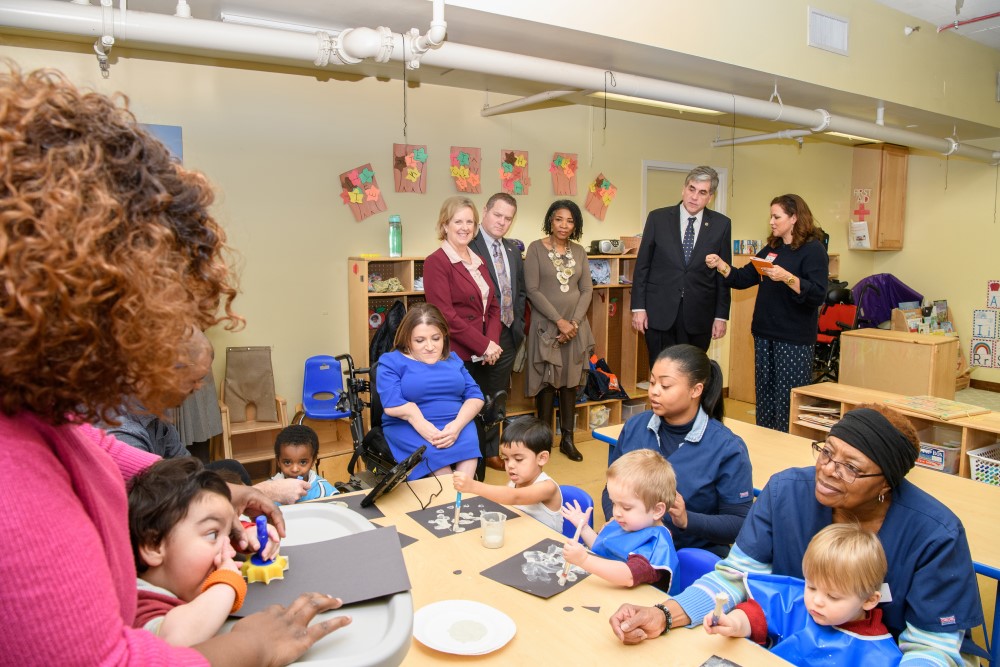
When Megan Scully's four month old son, Danny, was diagnosed with a developmental disability resulting from genetic brain lesions, two of the first questions she asked the doctors were, "would he ever go to school?" and "would he ever make friends?"
Danny is now three, and his mom says, "Not only does he make friends, but he gets in trouble! He has to be separated from his best friends at nap time because they make too much noise."
Danny's parents attribute much of his success to his participation in an inclusive early childhood program at the Harry and Jeanette Weinberg Child Development Center in Washington, D.C., where children with and without disabilities learn and play side-by-side.
Last week, HHS leaders had an opportunity to see this inclusive model in action and learn about the innovative partnership between the Georgetown University Center for Excellence in Developmental Disabilities (UCEDD) and Easterseals DC MD VA that makes it possible. HHS Deputy Secretary Eric Hargan, Assistant Secretary of the Administration for Children and Families Lynn Johnson and ACL Administrator Lance Robertson visited several classrooms and met with staff and parents at the center to hear about how the program works – and the difference it has made for families.
Danny's parents described the program as "a godsend."
"The kids push him, they are the best therapists," Scully said. "He wants to keep up with his peers."
About a third of the children in the program have disabilities, and many have significant care needs that have caused them to be turned away by other programs. The center offers early intervention services (including speech, physical, and occupational therapy) in the classroom so children with disabilities do not have to be separated from their peers for long portions of the day. The therapists work closely with teachers to continue therapy during the day and also offer services at home.
The program goes beyond merely putting children with and without disabilities in the same space. Instead, classroom activities are selected that meet the educational and developmental needs of all of the children. There often are activities that are educational and fun for all of the students, but which also meet a specific therapeutic need for a child with a disability. To the greatest extent possible, the goal is for the children to participate in the same activities.
Early childhood inclusion sets the stage for a lifetime of community living.
“It's just so natural for them, and they will carry that experience of inclusion and integration with them as they grow up,” said Robertson. “Ultimately, that's what community living is all about -- people of all ages and abilities, who are living, learning, working, and playing side by side. And this is where it all starts.”
One key to the program's success is a well-trained staff of support professionals. That is where the Georgetown UCEDD comes in. They offer training to early childhood professionals working throughout the District of Columbia, including at the Weinberg Center. The training utilizes the latest research on child development to prepare staff to understand the unique needs of children with developmental disabilities and their families.
Larry Bram, Senior Vice President of Innovation & Program Development at Easterseals DC MD VA says the program not only benefits children with disabilities, "it benefits kids without disabilities too, when it is done right."
Danny's parents agree, pointing out that Danny “teaches (his classmates without disabilities) that differences are okay.”
The Georgetown UCEDD is part of a national network of UCEDDs funded by ACL that work every day to expand opportunities for people with developmental disabilities. UCEDDs are a unique national resource addressing issues, finding solutions, and advancing research on a variety of topics including education, employment, assistive technology, health, housing, and transportation. They serve as a bridge between academia and the community, ensuring that the voices of people with developmental disabilities and their families inform research -- and that research findings are shared so they can be used to develop best practices for the benefit of the community.
Each year, UCEDDs train more than half a million professionals and community members. This group includes professionals ranging from Medicaid counselors and care providers to doctors, lawyers, and dentists as well as many people with developmental disabilities and their family members. UCEDDs also offer programs that train and prepare future generations of professionals. Several of the Weinberg Center's therapists got their start in the field of early interventions through a certificate or degree program run by the Georgetown UCEDD.
UCEDDs also often provide direct services for people with developmental disabilities and their families. These can include specialized clinics, screening programs, educational programs, camps, and more. In fact, they are often the first resource a family turns to after receiving a diagnosis.
Training and direct services are just two of the core services offered by UCEDDs in every state and territory in the country. UCEDDs also conduct groundbreaking research, develop and evaluate innovative new programs and interventions, and work with states and agencies to simplify the systems people with developmental disabilities have to navigate. No two UCEDDs are alike, with each UCEDD developing special niches and areas of expertise based on the strengths of their university and the needs of their community.
In the 55 years since President John F. Kennedy signed legislation establishing what we now call UCEDDs, the centers have not only expanded what they do, they have also found new ways to fund and sustain their work. ACL funding covers UCEDDs' core administrative functions, and UCEDDs are able to leverage this funding to secure grants and matching funds from their university, foundations, private donors, fee-for-service programs, and other federal and state agencies. In fact, for every dollar ACL invests in UCEDDs, UCEDDs secure an additional $15 in funding from other sources.
The children at the Weinberg Center learning from and with each other are just one example of the long-lasting impact of these investments.

